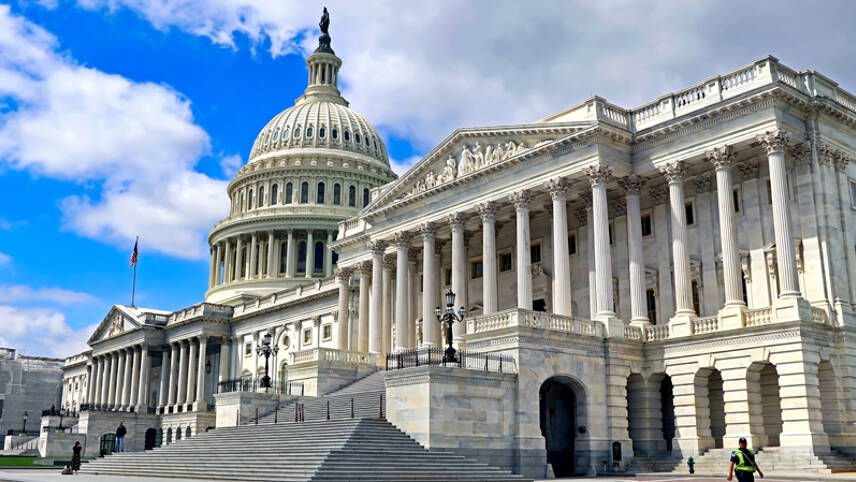Register for free and continue reading
Join our growing army of changemakers and get unlimited access to our premium content

A total of $369 is allocated to climate measures, down from Biden's original proposal of $555bn
Late on Sunday night (7 August) for those of us in the UK and Europe, the news came that the Senate had approved the Inflation Reduction Act – a package of measures to help vulnerable people pay for health care and to reduce emissions, with a focus on energy and transport. The news came after more than 18 months of wrangling in the Senate, with the Democrats facing fierce opposition from the Republicans and with some of its own members, notably Senator Joe Manchin, seeking to water down the bill.
The final version of the Act allocates a total of $369bn to climate action. It is hoped that the changes resulting from the Act will enable the US to reduce its annual domestic emissions by at least 40% by 2030, against a 2005 baseline.
For the energy sector, the Act sets the ball rolling for $27bn of government investment in emerging technology R&D, like floating wind, next-gen solar and hydrogen. It also includes a new tax credit scheme for those creating renewable arrays using existing technologies, to help with upfront costs. There is enhanced support for building wind and solar in or connected to low-income communities. Altogether, $64bn is set aside for renewable energy production and investment.
Nuclear energy production also gets a tax credit scheme, with a $30bn funding pot.
There is also a $60bn package for communities most affected by fossil fuel production, to be spent on upskilling and reskilling workers for greener jobs and to remedy the costs borne by these communities through trends like air pollution.
On climate adaptation, the Act includes Biden’s promised $2.2bn for new infrastructure in communities frequently affected by extreme weather events.
And, on transport, there is a new electric vehicle (EV) grant scheme for households. Subject to eligibility, drivers could receive between $4,000 and $7,500 in tax credits towards the cost of an EV. Across the private and public sectors and homes, the Act sets aside almost $23bn for subsidies on low-carbon transport. There is a separate $3bn pot to transition the US Postal Service’s fleet to electric.
It’s not just road transport covered by the Act, either. There are also new tax credit schemes for sustainable aviation fuels ($49m); alternative fuels for shipping (almost $3bn) and reducing emissions at ports ($3bn).
Energy efficiency in buildings is another key focus, with multi-billion-dollar packages set aside to improve the energy efficiency of owned and rented homes and commercial buildings, and to help these buildings adopt efficient heating and cooling. There is a $200m pot to establish state-led programmes training people to install and maintain these technologies.
A moment of celebration
Biden had originally proposed $555bn for climate action and sought a 50% reduction in emissions between 2005 and 2030. Biden told Congress members last month: “This bill is far from perfect. It’s a compromise. But it’s often how progress is made.”
$369bn is believed to be around six times more than the US federal government invested in climate action between 1998 and 2008, and four times more than was allocated between 2009 and 2019.
A statement released by Biden’s administration on Sunday states that the Senate “sided with American families over special interests”.
It reads: “This bill tackles inflation by lowering the deficit and lowering costs for regular families.
“This bill also makes the largest investment ever in combatting the existential crisis of climate change. It addresses the climate crisis and strengthens our energy security, creating jobs manufacturing solar panels, wind turbines, and electric vehicles in America with American workers. It lowers families’ energy costs by hundreds of dollars each year.
“It required many compromises. Doing important things almost always does.
“The House should pass this as soon as possible and I look forward to signing it into law.”
The Bill’s passage in the House should be far smoother than in the Senate, as the Democrats have more of a majority.
Sharing the White House’s statement, the President’s national climate advisor Gina McCarthy said: “This is a turning point in history. And this is the most optimistic I have ever felt about our ability to tackle the climate crisis. President Biden’s pen is ready – let’s get this bill to his desk.”
Several prominent figures in the US’s climate space have been celebrating the news, but highlighting that there is still much work to be done.
Mark Carney wrote on Twitter: “Finally climate policy action is getting real. The landmark climate, energy and tax legislation just passed by the US Senate joins the EU’s RePowerEU action plan and UK’s Energy Security Strategy to accelerate the G7 transition to reliable, affordable and clean energy. Expect more.”
Climate and energy policy professor Dr Leah Stokes, widely known for her book ‘Short Circuiting Policy’, Tweeted: “It took 19 hours. Or maybe 2 years. Or maybe 3 decades, depending on how you count it. But the US Senate has now passed a major climate bill. It was a compromise. We need to stand with frontline communities against the fossil fuel industry. But in this moment, I’m celebrating.”
The news came shortly after Australia’s new Government passed the country’s first climate target updates in more than a decade, while India and Egypt updated their Paris Agreement pledges in preparation for COP27. But, in less positive news, China and the US halted their climate talks last week, following speaker Nancy Pelosi’s visit to Taiwan.


Please login or Register to leave a comment.